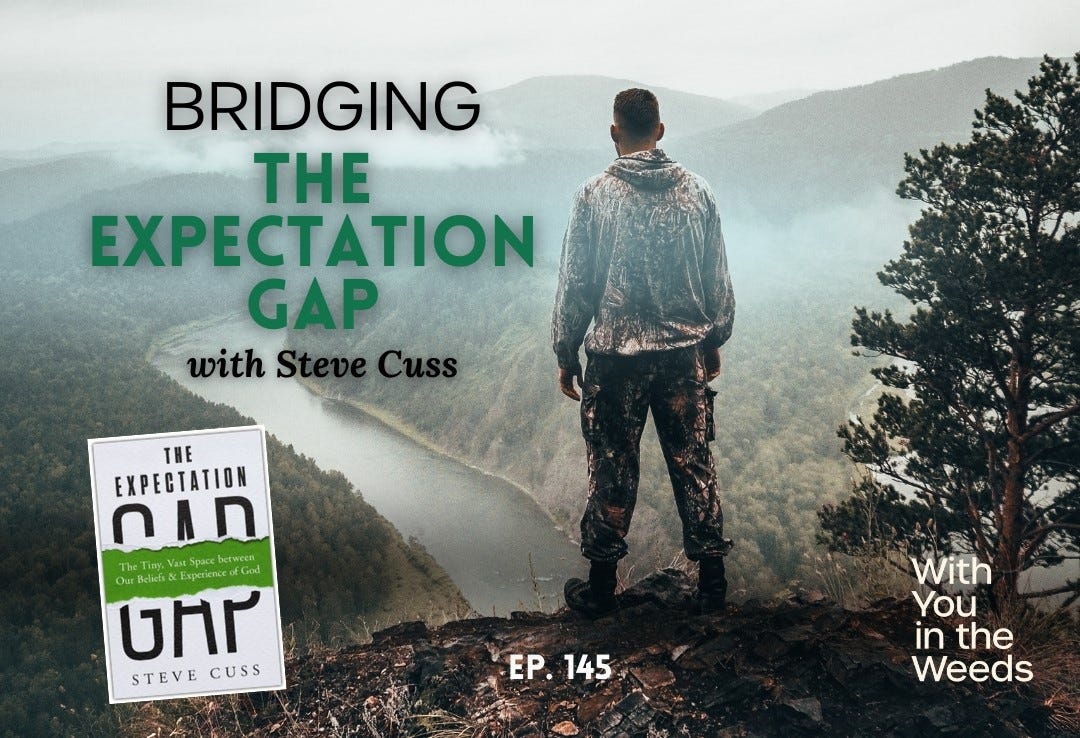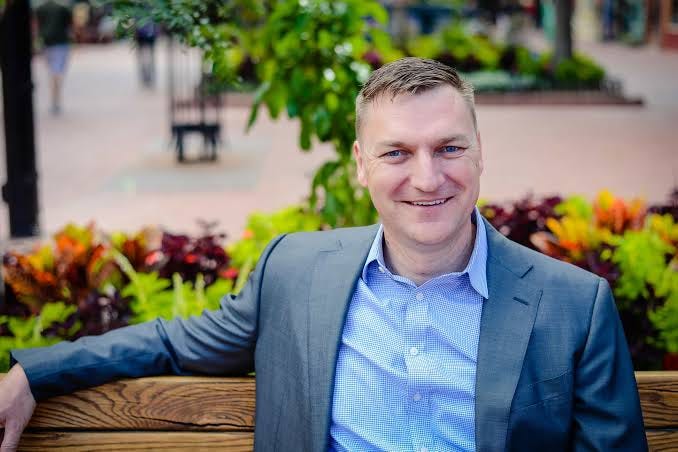Bridging 'The Expectation Gap' with Steve Cuss
Discovering true closeness with God
Does the gap between you and God sometimes feel like a chasm? Do you believe that God is in charge of your life, but find yourself trying to control everything? If you’ve noticed a gap between what you believe and what you experience, this episode is for you!
In this frank conversation, Austin sits down with pastor and author Steve Cuss to learn about his book, The Expectation Gap: The Tiny, Vast Space between Our Beliefs and Experience of God, and how the book came out of Steve’s honest analysis of the worrying disconnect he experienced between his faith and daily life:
I believe God loves me, but I don't feel it.
I believe God is with me, but I don't see him.
I thought I'd be further along in my spiritual progress by now.
As they talk about narrowing the expectation gap, Steve and Austin will address the false needs you may feel for control, perfection, knowing all the answers, being there for people, and seeking approval—and why those things will never bring joy and peace.
It turns out that true spiritual transformation isn’t about trying harder, but cultivating practices that bring you into God’s presence and increase your awareness of his goodness.
Highlights of Austin’s Conversation with Steve
Austin: In today's episode, you're going to get some very specific insight and takeaways that you can apply if you feel stuck in your Christian walk or are struggling to feel God’s love. Today I'm interviewing Steve Cuss, a chaplain with an MDiv in theology and tons of experience as a pastor and pastoral counselor. And he's an accomplished author to boot.
Steve, thank you for being with us today. Tell us a little bit about the ministry roles that you play, or any training or passions that I've missed.
Steve: Hi, Austin, it's wonderful to be with you. I don't think you missed much! My primary training is as a pastor. I no longer pastor a local church, but I do attend the church where I used to be the pastor. I spend most of my time now helping organizations to lower reactivity. That’s a fancy way of saying that I'm really good at helping people with the dynamics that infect their relationships.
There are four whopper dynamics that will infect all your relationships and make them all worse. I had a lightbulb moment when I realized that those same dynamics could infect your relationship with God. So that led to The Expectation Gap.
I spend most of my time training and coaching at organizations. Sometimes I'm brought in after a leader has made a mess of some kind. I help figure out the patterns, attempted solutions, and micro-adjustments needed to help resolve the issues. My heart’s desire is that we would all be well with ourselves, each other, and with God.
Austin: I'm getting the vibes that you're kind of a detective or like the coroner after something's happened. You come in, try to help make sense of it, and help people move forward. That’s very needed in today’s world. Let me just start with a broad question: Why this book now?
Steve: In 2016, I had been preaching for a long time at that point, and I noticed that my faith was moving into deism—the belief that God exists but isn't very involved in our lives. I don't defend it, but I couldn't seem to shake it. And I thought, this is not good. I can't be pastoring and preaching at a church when my own faith is heading that way. My typical tools to navigate it weren't working: more Bible study, more prayer—what I call the ‘faith-y’ things.
I'd been trained in systems theory as a hospital chaplain back in the nineties, and I'd studied it and taught it for years. Those tools started helping my faith. So I got quite energized. I thought, what if I bring systems theory into my relationship with God? By the time I wrote the book, it was a seven-year journey of looking at the dynamics between me and God, and changing the way I show up. It transformed my faith—it was life-changing.
Austin: Wow. How did you know it was transformed? What were some of the differences that you saw or felt?
Steve: I love this question. This is such helpful stuff for our faith. When I started this journey, my head believed in the peace of Christ and my body didn’t. My head believed in freedom in Christ—it's right there in the Bible. But my body didn’t.
So the way I know that I’m transformed is when my body believes what my head believes. Almost 10 years ago I started to cultivate some practices and habits that help me relax into God's presence physiologically. I now try to cultivate 12 to 15 habits a day, as well as weekly and monthly. I'm quite disciplined about tripping over God's goodness in little moments every day.
Austin: There are so many good things there. First, one of the things I do with my clients as a counselor is focus on the brain-body connection. It doesn’t solve every problem, but it helps people know where they are. Second, you just had a little phrase, ‘tripping over God's goodness’. God is present in our world. But the crazy pace of life can sometimes keep us from seeing God’s presence.
Steve: That's right. One of the four dynamics that affect relationships is reactivity. All you have to do is go on Facebook or Twitter and you can see reactivity play out on your feed. Reactivity is one of the top obstacles to noticing God because theologically, reactivity puts us in a posture of trusting self rather than trusting God.
You either get bigger than human-sized, or you get smaller than human-sized when you're reactive. And we've all seen this. Think of a staff meeting at work somebody tends to get more domineering—that's bigger than human. Someone else tends to get pretty quiet, smaller than human.
When you're bigger than human, you're pushing out awareness of God. You’re not leaving room for God’s presence. When you’re smaller than human, God is no longer your refuge and strength. You are now your own refuge.
When you're bigger than human, you're pushing out awareness of God. You’re not leaving room for God’s presence. When you’re smaller than human, God is no longer your refuge and strength. You are now your own refuge.
Austin: This is a good takeaway for me. Where do I find myself getting bigger out of insecurity, out of reactivity? And where do I find myself getting smaller? Somewhere in the middle is a healthy sense of godly confidence. This is who God has made me.
Steve: I call that middle ‘being human-sized’. That is when we are able to notice the Lord.
Austin: Let me ask you different question. The book is called The Expectation Gap. Can you tell us about those gaps? How can we identify what they are and if we have them?
Steve: Back in 2016, I got fed up with the difference between my belief in the Bible and my belief in reality. I started by asking people in my church and on social media the question, “Where do you find a gap between what you believe about God versus what you experience from God?” And I was really surprised, Austin, at how few people are asking that question.
I think it's almost the question for a follower of Jesus. I host a podcast called Being Human on Christianity Today. We ask every guest to answer that question. The top three gaps were:
Believing in God’s love but not feeling it
Believing in God’s presence but not seeing him
Thinking you’d be further along in your walk with God
As I said earlier, the first dynamic that affects relationships is reactivity. The second one is assumptions. As Christians, we make a lot of assumptions when we interpret the Bible. For example, you might go to church one Sunday and hear about Peter walking on the water with Jesus. You might be told to be bold and courageous like Peter.
The next Sunday, you might hear about Mary and Martha and how Martha was busy while Mary sat and worshipped at Jesus’ feet. You might be told to be a Mary, not a Martha. But Peter and Mary are completely different. There’s an expectation there that can never be reached.
To take things one step further, in the story of Jesus walking on water, only one disciple joined him—the others stayed in the boat and watched. But all 12 of them worshipped him. In fact, Peter isn’t even mentioned in the gospels of Mark and John. Focusing on Peter or Mary takes the focus off of where it should be—on Jesus.
Austin: Absolutely. Can I ask you about something else from your book? You talk about false needs: Control, Perfection, Desire to Know the Answer, Being There for People, and Approval. Can you share how these show up in relationships?
Steve: I call these the 5 Big False Needs of Humans. Most of us don’t have all five. I have the last three. Looking at number four, “Being There for People”, you might rightly say, what’s wrong with being there for people when they’re hurting? Nothing, it’s a gospel thing to do, but if you can’t tell the difference between their need and your need to be needed, you’re in trouble.
Austin: That seems so important. A counseling term for that is enmeshment. You’re not sure where you stop and the other person begins.
Steve: Yes, and there's a lot of implications for all of the false needs. I was raised by a perfectionist father. I love my dad, but I couldn't please him. My wife Lisa is a therapist, and she helped me have empathy for what he was carrying—he couldn’t hit his own internal target. It's a tortured existence because humans were never designed to be perfect. The truth is that the Big Five are God's character traits. God is in control. We don't have to be. It helps to know that.
The third relationship dynamic is predictable patterns. If you can learn to notice your predictable patterns, it's a game changer. The fourth one is related to predictable patterns, which is attempted solutions. The evidence of an attempted solution is ‘more of the same’ or ‘try harder’. But that’s not the way you grow in Christ. The end result of our spiritual walk is closeness with Christ, not being perfect.
You are in relationship with yourself. You talk to yourself; you listen to yourself. You have an inner critic that speaks to you in a way that you would never treat a friend. Then you realize Jesus said, “Love your neighbor.” The way you treat yourself ought to be congruent with the way you treat your neighbor. I've had to learn to be kind to myself and that's been a long journey for me.
I’ve learned to believe myself when I'm weary, angry, grieving, and sad. My tendency is to push it down and keep going. But I would never do that to you! I discovered that the kinder I am to myself, the more I'm able to receive God's kindness. Due to some complex issues in my childhood, my core belief was, “I'm not worth loving.” No wonder I struggled to experience God's love. My inner narrative batted it away.
Austin: That’s so good. Can I ask you, before we close, what is a Life-Giving List?
Steve: Jesus says that his Father loves to give good gifts to his kids. The Life-Giving List is an intentional capturing of it. We encourage people to begin by thinking of things that take 1-10 minutes. For me, rubbing my dog’s ears and taking him on a walk are two items on my list.
I live in Colorado, so looking at mountains is another one for me. Holding my wife’s hand, playing my guitar, reading a chapter of the Bible, praying for a nation in conflict. I have over 160 items on my list. Start with micro-habits and then look at bigger life-giving things in your life and you will find yourself tripping over God’s goodness at every turn.
Austin: Excellent. That’s something we can all do. Thanks so much for being with us, Steve, and we will see you next time on With You in the Weeds.
Recommended Resources:
Stevecusswords.com – Newsletter, books, podcast, seminars, and more
The Expectation Gap: The Tiny, Vast Space between Our Beliefs and Experience of God by Steve Cuss
Family Life-Giving List (PDF)





